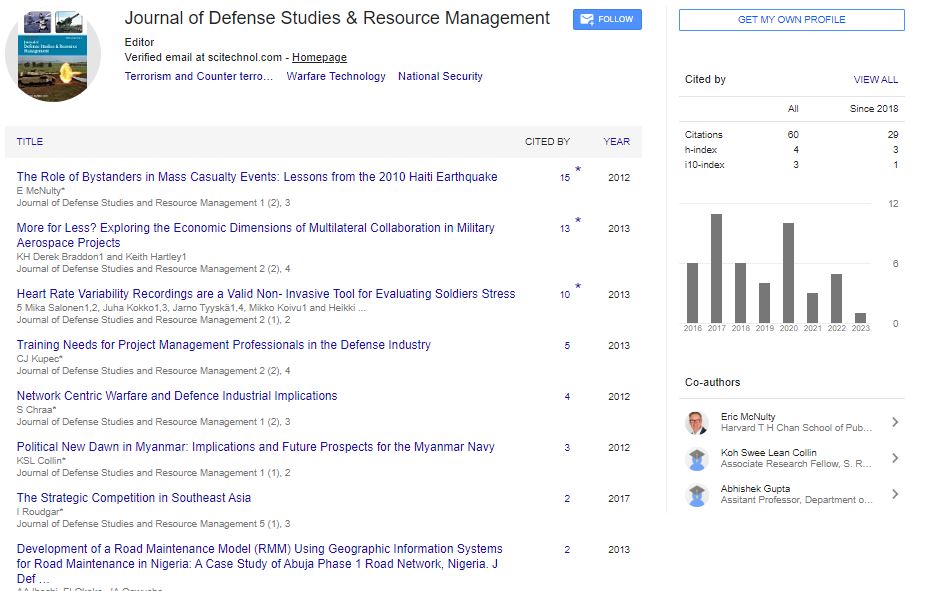Opinion Article, J Def Stud Resour Manage Vol: 11 Issue: 1
Integrating Intelligence into Defense Strategy
Xigen Cai*
Department of Journalism and Communication, Shanghai University, Shanghai, China
*Corresponding Author: Xigen Cai
Department of Journalism and
Communication, Shanghai University, Shanghai, China
E-mail: cai@xi.edu.cn
Received date: 28 February, 2023, Manuscript No. JDSRM-23-95542;
Editor assigned date: 03 March, 2023, Pre QC No. JDSRM-23-95542(PQ);
Reviewed date: 17 March, 2023, QC No. JDSRM-23-95542;
Revised date: 24 March, 2023, Manuscript No. JDSRM-23-95542(R);
Published date: 31 March, 2023, DOI: 10.4172/2324-9315.1000172
Citation: Cai X (2023) Integrating Intelligence into Defense Strategy. J Def Stud Resour Manage 11:1.
Description
Integrating intelligence into defense strategy is important for ensuring national security and protecting against threats to a nation's interests. Intelligence plays a important role in the planning, decisionmaking, and execution of military operations, as well as in the identification of potential threats to national security. Intelligence is defined as the collection, analysis, and dissemination of information that is relevant to national security. This information can come from a variety of sources, including Human Intelligence (HUMINT), Signals Intelligence (SIGINT), Imagery Intelligence (IMINT), and Open- Source Intelligence (OSINT). The integration of these different types of intelligence is essential for providing a comprehensive understanding of the threats facing a nation and for developing effective strategies for countering those threats.
The first step in integrating intelligence into defense strategy is to establish a clear understanding of the threat environment. This involves identifying the key actors, their capabilities, and their intentions. It also involves assessing the potential risks and vulnerabilities associated with different types of threats, such as cyberattacks, terrorism, and conventional military aggression.
Once the threat environment has been assessed, the next step is to develop intelligence requirements. Intelligence requirements are the specific information needs of decision-makers, which are used to guide the collection and analysis of intelligence. These requirements must be tailored to the specific needs of the defense strategy and must be constantly reviewed and updated to ensure that they remain relevant and effective.
The collection and analysis of intelligence are important components of the integration of intelligence into defense strategy. Intelligence collection involves the gathering of information from a variety of sources, including HUMINT, SIGINT, IMINT, and OSINT. This information is then analyzed to identify patterns, trends, and potential threats.
The analysis of intelligence involves the processing and interpretation of collected information to provide insights and recommendations to decision-makers. This analysis must be objective, rigorous, and based on sound methodologies. It must also be communicated clearly and effectively to decision-makers to enable them to make informed decisions.
Intelligence dissemination is the process of sharing intelligence information with relevant stakeholders. This includes military commanders, policymakers, and other decision-makers who need to be aware of the threats facing the nation. Effective dissemination of intelligence requires a clear understanding of the needs of different stakeholders and the ability to communicate complex information in a clear and concise manner.
The integration of intelligence into defense strategy also requires the development of effective intelligence-gathering capabilities. This involves the use of advanced technologies and techniques for collecting, processing, and analyzing intelligence information. It also involves the recruitment and training of skilled personnel with the expertise needed to operate these technologies and analyze the information they produce.
In addition to these technical considerations, the integration of intelligence into defense strategy also requires a strong ethical framework. Intelligence operations must be conducted in accordance with international law and human rights standards. They must also be subject to appropriate oversight and accountability mechanisms to ensure that they are conducted in an ethical and responsible manner.
The integration of intelligence into defense strategy is an ongoing process that requires constant adaptation and evolution. As the threat environment evolves, so too must the intelligence requirements, collection methods, and analysis techniques used to respond to those threats. This requires a culture of continuous learning and improvement, as well as the flexibility and agility to respond to changing circumstances.
Integrating intelligence into defense strategy is important for ensuring national security and protecting against threats to a nation's interests. This requires a clear understanding of the threat environment, the development of tailored intelligence requirements, and the effective collection, analysis, and dissemination of intelligence information. It also requires the development of effective intelligencegathering capabilities, a strong ethical framework, and a culture of continuous learning and improvement.
 Spanish
Spanish  Chinese
Chinese  Russian
Russian  German
German  French
French  Japanese
Japanese  Portuguese
Portuguese  Hindi
Hindi 